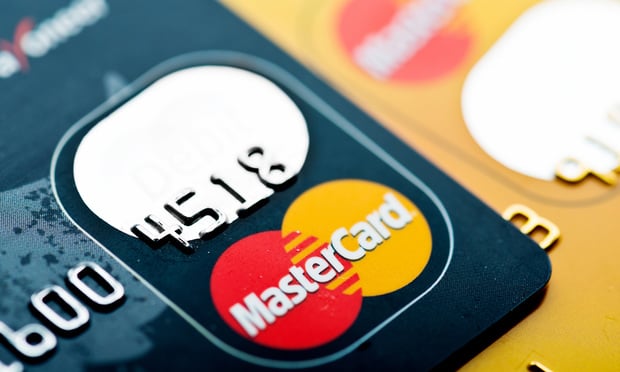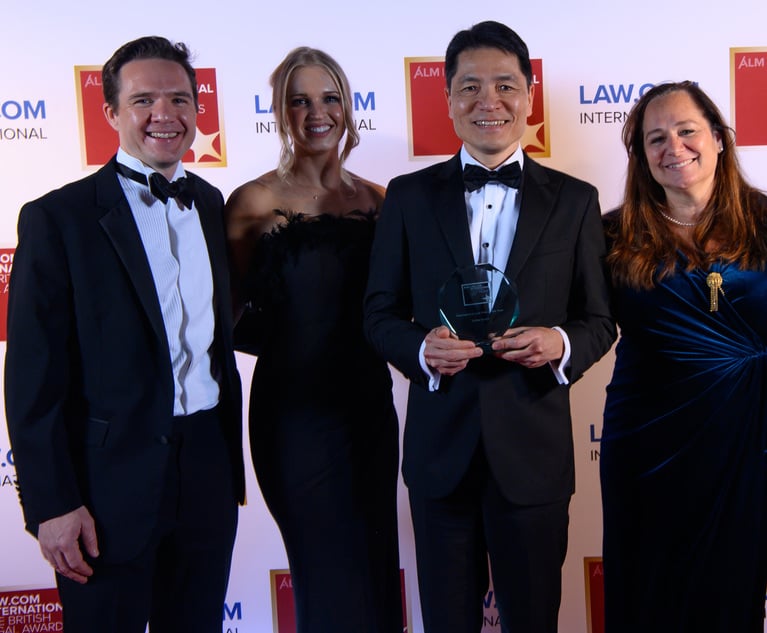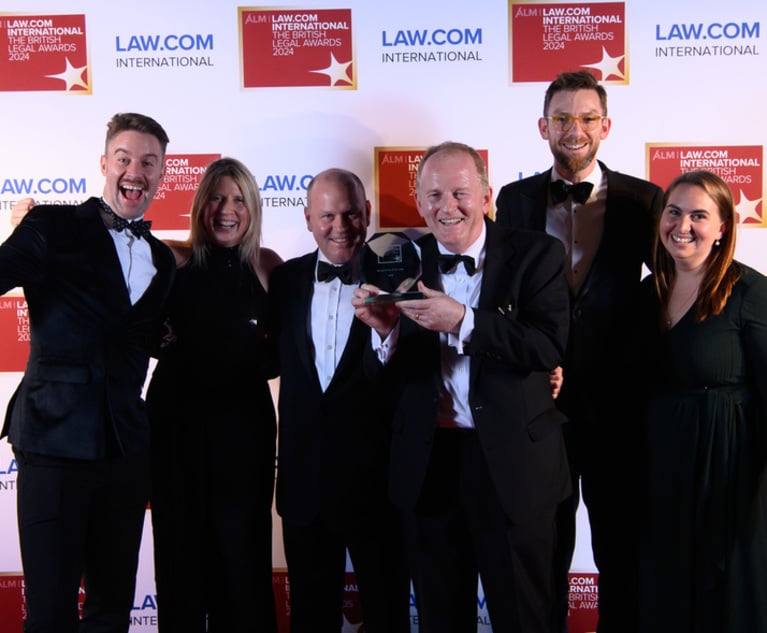Unprecedented Challenges: How Freshfields Managed the £14B Mastercard Case Under Lockdown
A lead partner on the high-profile dispute describes how his firm managed the Supreme Court virtual hearing in the face of the disruption brought about by the COVID-19 pandemic.
May 20, 2020 at 06:34 AM
7 minute read
 The closely-watched Mastercard dispute is one of the biggest pieces of litigation in recent years.
The closely-watched Mastercard dispute is one of the biggest pieces of litigation in recent years.
After much anticipation and countless headlines, the £14 billion Mastercard case last week made its passage through the U.K. Supreme Court, which will later this year hand down a judgment that is set to change the face of civil and commercial law.
The credit card giant was accused of inflating interchange fees – a sum charged between Mastercard and banks – over a period of 16 years, affecting up to 46 million consumers. The case, which first saw light in 2016, is among the biggest litigations in recent history and is a watershed moment for 'American-style' class actions in the U.K.
With Freshfields Bruckhaus Deringer acting for the defendant Mastercard, and Quinn Emanuel Urquhart & Sullivan overseeing a consumer collective action brought by former financial ombudsman Walter Merricks, the case has long been billed as a heavyweight showdown.
Here, one of the lead partners in the case—Freshfields' antitrust co-head Mark Sansom—talks about how his firm dealt with one of the Supreme Court's first-ever virtual hearings, and how his team managed the case under lockdown in the face of unprecedented logistical, technological, legal and even personal challenges brought about by the COVID-19 pandemic.
How did you prepare for the case while under lockdown?
One of the interesting things about the current working circumstances is how quickly and well people have adjusted to working remotely and using video conferencing technology. At Freshfields, using Microsoft Teams video calls has now become the default – including with our counsel and expert teams, and very often with our clients. Indeed, analogue voice-only phone calls already feel somewhat outdated. So the preparation for the Supreme Court hearing wasn't adversely impacted.
There is also a tremendous efficiency with electronic trial bundles, which is something we had already been pioneering in cases such as the BritNed v ABB case (the first cartel follow-on damages case to go to full trial) in 2018, well before the pandemic. But the current circumstances have of course made that a necessity.
What's it like taking on such a big case remotely?
The Supreme Court hearing actually worked very well by video link. We had all sorts of potential concerns. Would there be a delay between the closed feed used by the Justices and leading counsel and the general video feed used by instructing solicitors and the public? How would we give instructions to counsel in real time (answer: WhatsApp)?
The Justices even had a well-drilled system for asking questions: they would put up their hand so that the video operator could 'cut' to them, which actually worked very well. It was striking to see how enthusiastic the Supreme Court justices were in embracing this technology too, even urging some of the counsel in the case to be less reliant on hard copy bundles and to use the electronic versions instead!
Most of those involved, including the judges, attended the proceedings from home. It did appear, though, that a couple of the Justices were in chambers in the Supreme Court building.
On a personal level, how have you coped under lockdown?
 I'm very conscious that my circumstances are tremendously fortunate compared to those of a great many other people. My work remains as busy as ever – there seems to be no let-up in the progress of competition damages cases – and can be done effectively from home. We are lucky where we live to have outside space for exercise and for our kids, who are 11 and eight, to play in. I really feel for those, including many of our colleagues of course, who have been confined to small urban flats without easy access to fresh air and some nature.
I'm very conscious that my circumstances are tremendously fortunate compared to those of a great many other people. My work remains as busy as ever – there seems to be no let-up in the progress of competition damages cases – and can be done effectively from home. We are lucky where we live to have outside space for exercise and for our kids, who are 11 and eight, to play in. I really feel for those, including many of our colleagues of course, who have been confined to small urban flats without easy access to fresh air and some nature.
So while my home schooling and music teacher skills have been badly exposed, and it's challenging to juggle those responsibilities with hectic working days, I really have nothing to complain about given what so many others are contending with – in particular key workers and those working in front-line healthcare, of course, who have my complete respect and admiration.
How has the pandemic impacted the case, beyond it being virtual?
On a case such as this, a relatively confined appeal on points of law, conducting the appeal by video link didn't really impact at all – certainly not adversely. For other cases, however, in particular those with upcoming trials involving numerous factual and expert witnesses, the difficulties are more substantial – and some of those trials are understandably being postponed.
I can see video conferencing being used more routinely in future, even once the pandemic has hopefully abated. For example, some interlocutory hearings or the sorts of issues that currently involve attending a judge's or Master's chambers, or a conference call with the judge, could easily be done via video conferencing in future. There could actually be an efficiency in it.
Does well-being become even more important during big Supreme Court cases as this?
We certainly all have to look out even more for the wellbeing of our colleagues and others we work with. I think we all recognise the phenomenon of people working longer hours because they don't have the natural break of a commute to bookend the working day, or as many other commitments in the evenings just now.
It's a case of making sure that everyone gets the time away from their screens that they need to decompress, get exercise and rest, and catch up with family and friends, and to take time off even if they can't physically travel at present to go on holiday. I think we're all feeling our way somewhat, but – as in other areas of life at present – I think there will in fact be some positive lessons to be taken from this period of time in improving our working practices and ability to work flexibly.
When might we expect a judgment, and is the pandemic likely to delay it?
Ah – the perennial question! There's no set timeframe, of course. But best guess: September or October. I don't think the pandemic will have any impact on that timing; the Supreme Court has commendably pressed on with hearing the appeal and, now that it has done so, I doubt there would be any impact on the timing of judgment being handed down – assuming and hoping, of course, that all of the Supreme Court Justices remain safe and well.
Freshfields partners Sansom and Nick Frey are leading for Mastercard, alongside counsel Ricky Versteeg, associates Natalie Puddicombe, Ingrid Rois and Alex Holroyd, and trainee Sanj Canumalla. The firm's counsel include Mark Hoskins QC, Hugo Leith and Jon Lawrence of Brick Court Chambers, and Matthew Cook of One Essex Court.
Meanwhile, Quinn is leading for Merricks, with a team comprising litigation partners Boris Bronfentrinker and Nicola Chesaites, and associates Leo Kitchen and Hayden Dunnett. The firm is supported by barristers Paul Harris QC of Monckton Chambers and Marie Demetriou QC and Victoria Wakefield QC of Brick Court Chambers.
Read more:
Quinn, Freshfields Gear Up for Major UK Supreme Court Showdown… Via Videolink
NOT FOR REPRINT
© 2025 ALM Global, LLC, All Rights Reserved. Request academic re-use from www.copyright.com. All other uses, submit a request to [email protected]. For more information visit Asset & Logo Licensing.
You Might Like
View All
International Law Firm of the Year: A Q&A with Sidley Austin's London Managing Partner
5 minute read
Inside Travers Smith's AI Training, Development Efforts

From Olympic Aspirations to Legal Innovation: Tom Dunlop's Journey to Founding Summize
8 minute readTrending Stories
- 1Exits Leave American Airlines, SiriusXM, Spotify Searching for New Legal Chiefs
- 2Etsy App Infringes on Storage, Retrieval Patents, New Suit Claims
- 3The Secret Prior Art Problem Rears Its Ugly Head
- 4Four Things to Know About Florida’s New Law to Protect Minors Online
- 5US Supreme Court Considers Further Narrowing of Federal Fraud Statutes
Featured Firms
Law Offices of Gary Martin Hays & Associates, P.C.
(470) 294-1674
Law Offices of Mark E. Salomone
(857) 444-6468
Smith & Hassler
(713) 739-1250









